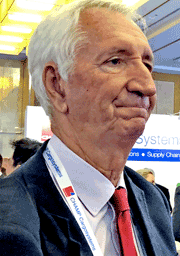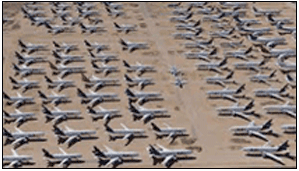
 |
| |
 |
 #INTHEAIREVERYWHERE |
| Vol. 19 No. 66 | Wednesday
October 7, 2020 |
| |
| If you have any words you’d like to share, any of your own playlists you’d like us to help distribute, or other content that has helped you navigate this difficult time, please share them with us. Air Cargo News FlyingTypers hopes to be like an online hearth for our cargo family. #AirCargoCoronaContent |
 |
Cargo Network Services President Mike White is stepping down
from that post at the end of 2020, having decided to retire from IATA
CNS to pursue other interests. |
Dr. Jan Hoffmann is Chief, Trade Logistics Branch in the Division on Technology and Logistics at UNCTAD. In different capacities through our careers, I have been able to meet with Jan Hoffmann several times. Becoming acquainted with Jan has been both a privilege and a discovery for me. If one looks at the assembly of impressions and observations Jan has been able to put together, starting from his oblique way of looking at international trade in his worldwide journey through haircuts, one soon understands that one is dealing with a strongly original thinker. In the interview you will also understand that the imaginative thinker contained in his genes manages to easily comply with the strict requirements of international diplomacy, and this is an accomplishment indeed. Gusto In Forschung Need To Learn And Adapt Quickly Lessons In History
Despite the numerous challenges, the maritime
transport industry has overall been able to weather the storm caused by
the COVID-19 crisis. The industry managed to continue operations and ensure
the delivery of essential goods as well as trade while at the same time
maintaining profitability. Strict capacity management ensured that freight
rates remained stable or even increased during the crisis, leading many
carriers to expect 2020 to be a profitable year. |
 |
 Despite what you have read or may think you know about Hong Kong reports
of that gateway and world money center’s demise deserve a closer look:
Despite what you have read or may think you know about Hong Kong reports
of that gateway and world money center’s demise deserve a closer look:”It’s not over, in fact Hong Kong ‘s exit from the world stage is simply not going to happen,” Hong Kong-based Bob Rogers, who also is the driving force of the global organization ULD CARES told me. “I think one would have to get up very early in the morning to find somebody who doesn't have good memories of Hong Kong. I arrived here on the 29th of December 1974 and while I had a job I certainly never imagined that I would still be here, approaching 46 years later. “Today I remain optimistic and excited about the coming years for Hong Kong, the sheer grit of the people is a constant source of inspiration and from time to time amusement. “Personally, I think there is very little to worry about and in fact our best years are probably ahead of us. “I could fill a bookshelf with books forecasting the end of Hong Kong, people have been writing them for years and like a broken clock that tells the right time twice a day maybe one day they will be right but I don't think it's any time soon. “One of the problems we have is that this is an extremely attractive place to live if you are a news man, it offers all the comforts of modern living in a very exciting city, including the Foreign Correspondents Club with an extremely substantial bar at which journalists can spend much of their time but of course have to crank out articles for the head office every so often so they run around the corner and see if they can find something bad to write about!” And what about the greatness of the Chinese people? “Having spent 45 years living and working amongst them the Cantonese; they are a continuous source of inspiration, and have a ‘never say die’ approach. “This of course can sometimes tie things in knots as happened last year, it is just one part of living amongst an extremely enthusiastic and sometimes over volatile population! “But for a moment let’s just about trade. “I listened to an interesting presentation from the Asia Society the other night, talking about the current Cold War between the U.S. and China. “While the three very erudite panelists agreed that negotiating the politics would be extremely difficult and that you would have to choose one side or the other, they also agreed that all the numbers indicate that trade is not being affected at all and in fact the most recent figures coming out of China are all on the up. “On a lighter side, I wonder if you are aware of the incredible demand for home bread makers in the pandemic? “Demand has gone off the rails and guess where in 2020 most bread makers are being made? “Here is a sign of the confidence in Hong Kong. “With the world’s airline industry in dire straits, Hong Kong International Airport is ploughing ahead at full speed with the third runway project due to open in about three years’ time. “This is the sort of ambition that makes Hong Kong the place it is, so stay tuned,” Bob Rogers declared. Geoffrey |
Hair
on fire media meltdown in America with the virus finally landing at 1600
Pennsylvania Ave. Immediate effect saw markets shaken, not stirred by the
end of Friday. The news of the COVID-19 attack on the sitting U.S. President
clouded to some degree attention from the leading U.S. airlines getting
stimulus relief, thereby averting massive layoffs in the U.S. that reportedly
would have seen AA & UA furlough up to 32,000 jobs. The carriers said
if they get the bailout from the U.S. Government (that may have happened,
we hope by the time you read this) it could reverse that draconian course.
The United States Treasury Department has offered loans to seven major airlines: Alaska, American, Frontier, JetBlue, Hawaiian, SkyWest, and United. The Treasury was authorized by the CARES Act to make affordable loans valued at up to a total of $25 billion to the airlines. The goal is to provide the companies with enhanced liquidity, and each airline is entitled to receive up to $7.5 billion in funding, as long as they comply with certain conditions. |
|
 If you had not guessed it yet, the airport that reflects the community best is Miami International. From its sprawling air cargo center where mammoth reefers are masquerading as cargo transfer facilities, to its long corridors up and down the central passenger areas filled with Cuban coffee stands with Latin finger food to the always sunny and lilting rhythm of people, language and outright hospitality, MIA has it all going on. Air France resumed service October 6 with three weekly flights to Paris, providing MIA with its first flights to France since the pandemic began. Colombian flag carrier Avianca is back serving MIA with 16 weekly flights. Newbie Colombian LCC Viva Air is now flying five weekly flights to Medellin. MIA pax carriers stand at 22, outnumbered by 31 all-cargo airlines currently in operation. Still a far cry from pre-pandemic 100 passenger and cargo airlines—but signs that the full stop punch in the nose stoppage of service is easing a bit, is good news. |
 |
 |
If
You Missed Any Of The Previous 3 Issues Of FlyingTypers Access complete issue by clicking on issue icon or Access specific articles by clicking on article title |
||
 Vol. 19 No. 63 Ethel Aviation Guiding Light Chuckles for September 21, 2020 Helicopter Lady China is Once in the Future Letters to the Editor |
|
|
Publisher-Geoffrey Arend
• Managing Editor-Flossie Arend • Editor Emeritus-Richard
Malkin Film Editor-Ralph Arend • Special Assignments-Sabiha Arend, Emily Arend |
Send comments and news to geoffrey@aircargonews.com
|